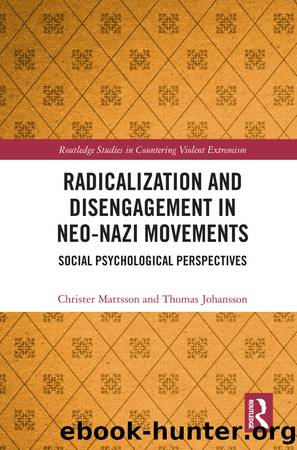Radicalization and Disengagement in Neo-Nazi Movements: Social Psychology Perspective by Christer Mattsson & Thomas Johansson

Author:Christer Mattsson & Thomas Johansson [Mattsson, Christer & Johansson, Thomas]
Language: eng
Format: epub
Tags: International Relations, Radicalism, Fascism & Totalitarianism, Political Ideologies, Political Science, Law Enforcement, Terrorism, General
ISBN: 9781000463125
Google: 21E_EAAAQBAJ
Goodreads: 57932712
Publisher: Routledge
Published: 2021-09-27T13:09:00+00:00
Today Carl feels confident that he has paid back what he owed, and he does not feel guilty any longer unless he talks about specific incidents. The guilt feelings are more or less gone, through the act of compensate for his bad deeds. Ultimately, Carl felt uncomfortable about doing âgoodâ deeds that he was not inspired to but felt compelled to do. Eventually, he figured that the ongoing process of redemption was keeping him tied to his former identity as a neo-Nazi, even if it is a former identity. He decided to stop seeking redemption and only do things he really believed in.
You know what I really regret? If I had a time machine, itâs stupid, I know, but sometimes I think like thisâ¦. [then] I would have asked Mum to find me a better school. To find us a better place to live. I would do good things for myself then, get myself an education, have a nice life and do the things I wished I had done. If that had been the case, I would never have had to waste my life like I did.
Thinking about the choices he should have made has led Carl to find the strength to go back to school, get his grades and enroll in university. During this transition, he realized that he could not be a former neo-Nazi any longer, as it was tying him to what he was and thus limiting what he could become.
I donât want to get a job because Iâm not a former neo-Nazi any longerâ¦. I donât feel like a former neo-Nazi any longer. I do feel that I donât want to be a former neo-Nazi anymore.
Disengaging from a violent and extreme movement takes time. Our informants used different strategies and made different life choices. As a part of the disengagement process, confronting their violent background seemed to play a key role in shaping a new life. Confessing to and compensate for their violent acts in the past also seemed to be an important part of the disengagement process for some of the informants, a means of forming a new and more âtrueâ identity (Foucault, 1979). However, this was just one step toward leaving behind the identity of being a former neo-Nazi. Disengaging does not necessarily mean confronting oneâs violent past; in some of the narratives, we also noticed a high degree of ambivalence, and even perhaps a longing for past times and being part of a closely knit and embracing homosocial, violent and masculine culture.
Download
This site does not store any files on its server. We only index and link to content provided by other sites. Please contact the content providers to delete copyright contents if any and email us, we'll remove relevant links or contents immediately.
| Anarchism | Communism & Socialism |
| Conservatism & Liberalism | Democracy |
| Fascism | Libertarianism |
| Nationalism | Radicalism |
| Utopian |
The Secret History by Donna Tartt(19053)
The Social Justice Warrior Handbook by Lisa De Pasquale(12187)
Thirteen Reasons Why by Jay Asher(8893)
This Is How You Lose Her by Junot Diaz(6877)
Weapons of Math Destruction by Cathy O'Neil(6265)
Zero to One by Peter Thiel(5787)
Beartown by Fredrik Backman(5737)
The Myth of the Strong Leader by Archie Brown(5500)
The Fire Next Time by James Baldwin(5431)
How Democracies Die by Steven Levitsky & Daniel Ziblatt(5215)
Promise Me, Dad by Joe Biden(5141)
Stone's Rules by Roger Stone(5081)
A Higher Loyalty: Truth, Lies, and Leadership by James Comey(4954)
100 Deadly Skills by Clint Emerson(4921)
Rise and Kill First by Ronen Bergman(4780)
Secrecy World by Jake Bernstein(4741)
The David Icke Guide to the Global Conspiracy (and how to end it) by David Icke(4709)
The Farm by Tom Rob Smith(4502)
The Doomsday Machine by Daniel Ellsberg(4484)
